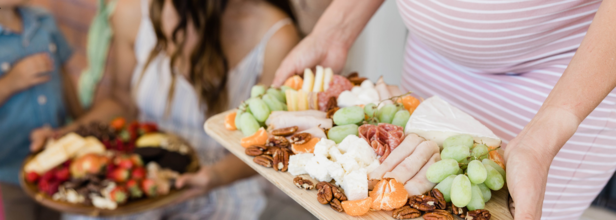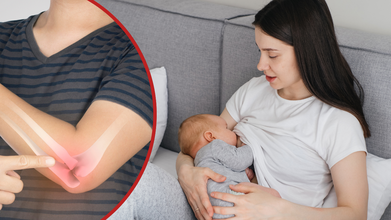- Health Conditions A-Z
- Health & Wellness
- Nutrition
- Fitness
- Health News
- Ayurveda
- Videos
- Medicine A-Z
- Parenting
- Web Stories
Can You Eat Goat Cheese In Pregnancy?

Credits: Canva
Who does not like to eat, especially when they are caving during pregnancy? Especially cheese. It is perfect for any occasion. Goat cheese is a delicious addition to many dishes, but it is important for pregnant women to know which types are safe for them to consume.
This guide could help you see which goat cheese can you consume during pregnancy.
Types of Goat Cheese to Avoid
There are certain goat cheeses which could be unsafe for pregnant women. This is because of the risk of Listeria monocytogenes, a bacteria that can cause listeriosis. Women in pregnancy are 10–20 times more likely to contract listeriosis compared to others. While symptoms for the mother might be mild, such as fever or flu-like illness, it can cause severe complications for the baby, including meningitis, blood infections, or even death.
Here is what you can refer to for a better understanding of a safer cheese
Soft goat cheeses made from raw, unpasteurized milk have a higher risk of bacterial contamination.
Surface-ripened goat cheeses, which are also known as mold-ripened cheeses, have a soft white rind, similar to Brie or Camembert.
The Food and Drug Administration (FDA) reports that raw and surface-ripened soft cheeses are 50–160 times more likely to be contaminated with Listeria compared to pasteurized varieties.
So, it is always best to avoid soft goat cheeses that are surface-ripened or made from raw, unpasteurized milk to reduce the risk of listeriosis. However, if you are still confused, consult a doctor or a nutritionist.
What are the safer options available?
Some goat cheeses are considered safe to eat during pregnancy, as they have a much lower risk of bacterial contamination. However, it’s still essential to check labels and follow safety precautions.
These goat cheeses include:
Pasteurized goat cheese. This is because the process of pasteurization kills harmful bacteria, yeast, and mold in milk, making these cheeses safe, provided they aren’t surface-ripened.
Hard goat cheeses, whether pasteurized or unpasteurized, have low moisture content, which prevents bacteria from growing. You can identify hard cheese by pressing it — it won’t dent like soft cheese.
Some tips that can come in handy while cooking:
When you cook goat cheese, make sure that it’s thoroughly heated can also make it safe to eat. Ensure dishes like goat cheese tarts or pizza are cooked to an internal temperature of 165°F (74°C).
Is Goat Cheese Safe While Breastfeeding?
After pregnancy, most foods — including all types of goat cheese — are safe to eat during breastfeeding. Unlike pregnancy, the restrictions on certain foods are much more relaxed.
However, diet can influence breastmilk. If your baby shows signs of illness or fussiness after feeding, consult a healthcare provider. Some infants may develop a sensitivity, such as a cow milk protein allergy, which is common during the first year of life.
12-Year-Old Suffers Seizures At Dinner: Neurologist Reveals Rare Case Of ‘Eating Epilepsy’

(Credit- Canva)
For months, the parents of 12-year-old Rahul were puzzled by his strange behavior at the dinner table. He would suddenly stop eating, stare blankly, twitch his lips, and rest his head on the table, only to resume eating a few minutes later as if nothing had happened. His parents initially dismissed this as fussiness or "temper tantrums."
At first, Rahul's parents thought his strange behavior at the dinner table was just him being difficult. But when he started getting really bad headaches that kept him from playing sports and doing his schoolwork, they knew something was wrong and took him to a doctor. The headaches looked a lot like migraines at first.
But when his parents mentioned the strange way he acted while eating, Dr Sudhir Kumar MD immediately had a suspicion. This seemingly small detail was the key to understanding what was happening. It turned out Rahul had a rare condition called Eating Epilepsy, where the act of chewing and swallowing can cause seizures. A special video test while he was eating finally confirmed the diagnosis, showing that his odd behavior was actually a type of seizure.
This is a real-life case Neurologist Sudhir Kumar posted on his social media X. He detailed the case and highlighted this rare-form of epilepsy.
What is Eating Epilepsy?
According to the European Journal of Epilepsy, eating epilepsy is a rare condition where seizures are triggered by eating. Though it can look different from person to person, some common patterns have been found through a review of 52 studies involving 378 patients.
This review, which looked at studies published before March 2020, aimed to better understand this unique disorder. Here's what the research found:
Eating seizures most often begin in a person's teenage years, and they are more common in males.
The seizures are typically focal-onset, meaning they start in a specific area of the brain. Most commonly, they are a type called focal impaired awareness seizures, where the person appears to be awake but isn't fully aware of their surroundings.
In the studies, 80% of the patients were treated with medication. However, about 25% of them had poor control over their seizures, meaning the medication didn't work very well.
How Was Eating Seizures Treated in Rahul?
Dr Sudhir explained that once he knew what was wrong, they were able to help Rahul right away. They gave him the proper medication to control the seizures, and they also treated his migraines. Within a month, his headaches were much better, and he was able to eat without any problems. Six months later, Rahul was back to being a normal, happy kid. He could eat, play, and study without fear. The whole family was relieved that the stressful dinner-time episodes were finally over.
Dr Sudhir’s Lessons For Medical Professionals
This case offers several important lessons for junior doctors, said Dr Sudhir in his post. He listed 5 crucial points that all medical professionals should remember when treating patients.
Listen carefully to the patient's history. What parents describe as "tantrums" or "fussiness" might be a sign of a neurological disorder.
Consider rare conditions. Be aware of reflex epilepsies, which can be triggered by specific actions like eating, reading, or flashing lights.
Use diagnostic tools wisely. A video EEG, where the suspected trigger is provoked under medical supervision, can be the only way to confirm a rare epilepsy.
Treat all conditions. Rahul had both epilepsy and migraines. Addressing both of these issues was key to dramatically improving his quality of life.
Show empathy. Reassuring and addressing the family's concerns is just as important as prescribing the right medication.
He ended the post with a cautious note “Not all unusual behaviors in children are "habits" or "tantrums." Sometimes, they may signal an underlying medical condition. Timely medical attention can make all the difference.”
Debby Ryan And Josh Dun Announce Pregnancy, Why Are Women Now Planning Pregnancy After 30?

Credits: Instagram
Debby Ryan Pregnant: Former Disney star and actress Debby Ryan announced her first child with drummer of 21 Pilots, Josh Dun. The announcement was posted on Sunday, where she and her husband shared that they are expecting their first child, with a collection of photos captioned "dun&dun +one".
Ryan 32, got married to Dun, 37 in 2019.
Having Kids Later In Life
The National Institutes of Health (NIH), US states that after age 30, a woman's fertility decreases every year. The number and quality of her eggs goes down until she reaches menopause. So, now the question arise, why are women planning their pregnancy later in life?
A 2019 Guardian report states that the number of pregnancies among women aged 30 and above in England and Wales has surpassed the number among women in their 20s for the first time since records began. The Guardian quoted Natika H Halil, the then chief executive of the sexual health charity FPA, who said that women waiting longer to have children could be due to many reasons, but not limited to, including: "higher costs of living, fewer young people able to afford mortgages, or perhaps feeling less pressure or desire to start a family”.
Another 2024 report by TIME showed that the bird rate among US women in their early 30s was higher than the rate among in their late 20s. The reasons could be financial and child care concerns, waiting longer to get married or find a partner, and prioritizing education, career or leisure time during young adulthood. TIME quoted Aurélie Athan, a clinical psychologist who researches the psychology of motherhood and reproductive identity at Columbia University's Teachers College, who described this phenomenon as "pregnancy pause". "They’re really taking time to say, ‘Do I want to do this?'" Athan said.
Read: Here's What New Mothers In Their 30s Should Pay Attention To
A more recent 2025 report by NBC stated that the most recent data show that most births now occur to women ages 30 to 34, while a decade ago it was 25 to 29. The Centers for Disease Control and Prevention (CDC), which tallies all known births in the US reported from 1990 to 2023, the fertility rate for women ages 35 to 39 increased by 71%. Experts point out the reasons include: volving social expectations and values; changes in technology and dating behavior; the economic burden of child rearing; and increasing college enrollment among women.
How Can You Plan Your Pregnancy After 30?
Quit Habits: If you are a smoker, or consume alcohol, this is a good time to leave it.
Reduce Stress: While pregnancy for some can bring stress, try to find activities that help you release it.
Healthy Weight: Ensure that your weight is right, reduce your waist to bring it to a healthy range for a healthy pregnancy.
Food Habits: Stop eating junk and start eating more whole grains.
Exercise: A sedentary lifestyle can impact negatively on the child. You do not have to do HIIT, however, regular easy workouts can make both the pregnancy and delivery easy.
Read More: Women Are Now Waiting More Before Becoming A Mother, Age Trend Shows Motherhood From 2016 to 2023
Dr Michelle Y Owens, professor of obstetrics and gynecology and a practicing maternal-fetal medicine specialist at the University of Mississippi Medical Center in Jackson, writes for the American College of Obstetricians and Gynecologists (ACOG) that "the longer your eggs have been around, the more likely they are to produce a pregnancy with a chromosome problem that can lead to a condition like Down syndrome. The risk goes up significantly after 35."
However, she says, there is a good news. Now, we have tools to detect and respond to pregnancy complications early.
Strong Babies, Weak Bones? Does Breastfeeding Actually Cause Women To Lose Bone Density?

(Credit-Canva)
Pregnancy changes a woman’s body in many different ways. Not only do women experiences changes in their hormonal balance, but they also find that things like pelvic pain urine leakage etc., may become permanent as well.
It is also not new information how a mother’s body prioritizes the health of the baby, over its own sustenance, however, does that mean this could cause the mother’s health to suffer permanently?
A few studies have suggested that women who breastfeed often lose their bone density, causing them issues like osteoporosis. Osteoporosis, a condition that makes bones weak and brittle, is a big health concern, especially for women after menopause. Doctors and researchers have long wondered if pregnancy and breastfeeding could play a role in this later in life.
The main idea is that during pregnancy and breastfeeding, a woman's body needs a lot of calcium for the baby. This high demand, along with low estrogen levels, might affect the mother's bone health.
Does Breastmilk Draw Nutrient From Women’s Bones?
According to National Institute of Arthritis And Musculoskeletal And Skin Diseases during both pregnancy and breastfeeding, a mother's body needs a lot of calcium to help her baby grow. Some of this calcium comes from the mother's bones, which naturally causes a temporary decrease in her bone density. This is a normal part of pregnancy and breastfeeding and usually happens most during the third trimester and while she is nursing.
While a temporary decrease in bone density is normal during pregnancy and breastfeeding, your bone density usually returns to normal after you give birth and during or after you stop breastfeeding.
However, in very rare cases, some pregnant or nursing women might develop osteoporosis. This can lead to fractures, especially in the spine, that can happen without much stress or injury.
Does Breastfeeding Increase Risk of Osteoporosis?
Many studies have looked into this issue, but there is still no clear answer. Some research suggests a link, while other studies don't. Because there's no agreement among experts, a 2024 study was done to get a better understanding. Researchers reviewed all the available information on osteoporosis, pregnancy, and breastfeeding to see what the facts currently show.
However, what researchers found was much different than they anticipated. Researchers at UC San Francisco and UC Davis solved the mystery of how breastfeeding women's bones stay strong even when calcium is taken from them to make milk. They discovered a new hormone called Maternal Brain Hormone (MBH), also known as CCN3, that makes bones stronger and denser. This finding, published in Nature, could one day help people with broken bones and diseases like osteoporosis.
Could This Research Lead To Better Bone Health Care?
The researchers found that when they gave MBH to young and old mice, both male and female, their bones became much stronger. In some very old female mice that had no estrogen (which normally helps build bones), the hormone was able to more than double their bone mass.
To see if MBH could help with healing, the scientists created a special gel patch that slowly released the hormone onto a broken bone. In older mice, whose bones normally don't heal well, the patch helped new bone form and heal the fracture. This successful outcome has never been seen before with other treatments. The researchers are excited about the potential of MBH to help people with various bone conditions, including:
- Women after menopause who are at high risk for osteoporosis, a disease that causes bones to become weak and break easily.
- Breast cancer survivors who lose bone mass from their treatment.
- Elite female athletes.
- Older men who have suffered a hip fracture.
How Much Calcium Do Women Need?
The amount of calcium a woman needs each day doesn't change when she is pregnant or breastfeeding.
Ages 14-18: 1,300 mg per day.
Ages 19 and older: 1,000 mg per day.
Getting more calcium than these recommended amounts from food or supplements won't stop the temporary bone loss that happens during this time. For this reason, extra calcium doesn't have a big impact on how much bone a woman loses. If you're pregnant or nursing and are thinking about taking a calcium supplement, you should always talk to your doctor first.
© 2024 Bennett, Coleman & Company Limited

